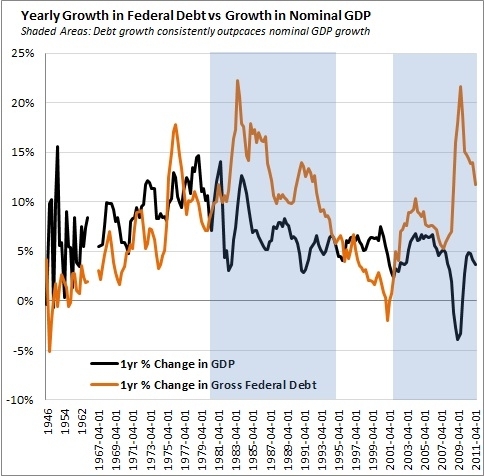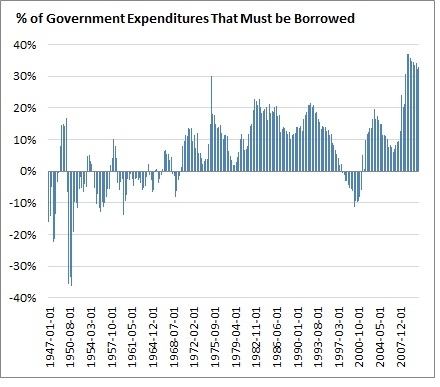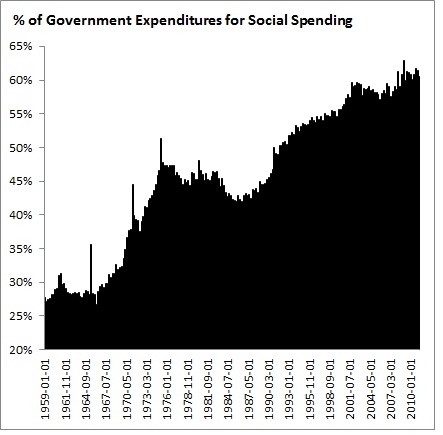Bernholtz Line: we have passed into the danger zone
Readers already know that I am recommending a slow panic on a personal level and activism on the political level. To my mind, it is certain that we are in for a hard fall that breaks through the floor.
The only way to stop it would be to elect a Tea Party Congress and a President not afraid of using a scalpel. I do not think Messers. Gingrich and Romney are smart enough to be vicious. Perhaps, I am wrong. Once that happens and the scalpels are out, then a one-time tax and/or a voluntary contribution would be make sense, but not if the spenders are still in power. Who wants to give money to a junkie?
Peter Bernholz (Professor Emeritus of Economics in the Center for Economics and Business, University of Basel, University of Switzerland) seems to be the man to quote these days. His take, see below, is that in the 12 largest hyperinflationary events, the alarms sound when a government crosses the Bernholtz "line" which is when governmental debt is 40% of its expenditures. The U.S. passed that line last year. We are at 42% and rising. Japan is in its eighth year, the music is about to stop, and there is no chair left. I read an analysis that Japan will have a good 2012 because it is responding to the nuclear disaster. Short sighted.
In the meantime, the Democrats want to increase taxes so they can increase expenditures. They say the Tea Party people are mean. The GOP elite nod their heads in the back. The dementia of European socialism has hit the U.S. with a powerful force. It seems the new purpose of government is to pay money to people. The demented continue on a path even though they see is has never worked. [There is the concurrent argument that collapse is the intent of the left.]
We have a marriage that is going bad. Dad has three jobs and sees the credit card bills exceed his ability to pay, hence the interest rates will go up as his credit worthiness goes down. Mom is mentally ill and spends her life buying things so the kids will like her. She goes to lunch with her friends wearing her new clothes. They all live in a fancy house with a 40% mortgage. Mom hides her credit card bills.
The children and Mom think Dad is mean and selfish. There is no solution in asking Mom to show some logic, she is ill. Children are children. So, Dad has to act boldly even if his actions are hated. Dad is working toward a heart attack and has to deal with the situation.
Below, is a good starting point:
The there is a difference to the current challenges. The GDP can no longer overcome the governments taxation and regulation, so the massive jump in Gross Federal Debt is met with an inverted GDP, not a rebounding one. Why? One reason is that the governmental expense is to buy votes with social programs, not feed the economy. One result it the government hands out money then immediately acts to water it down. [Yes, prices inflation is rampant, though the government does not track food and fuel so it reports everything is fine.]


The only way to stop it would be to elect a Tea Party Congress and a President not afraid of using a scalpel. I do not think Messers. Gingrich and Romney are smart enough to be vicious. Perhaps, I am wrong. Once that happens and the scalpels are out, then a one-time tax and/or a voluntary contribution would be make sense, but not if the spenders are still in power. Who wants to give money to a junkie?
Peter Bernholz (Professor Emeritus of Economics in the Center for Economics and Business, University of Basel, University of Switzerland) seems to be the man to quote these days. His take, see below, is that in the 12 largest hyperinflationary events, the alarms sound when a government crosses the Bernholtz "line" which is when governmental debt is 40% of its expenditures. The U.S. passed that line last year. We are at 42% and rising. Japan is in its eighth year, the music is about to stop, and there is no chair left. I read an analysis that Japan will have a good 2012 because it is responding to the nuclear disaster. Short sighted.
In the meantime, the Democrats want to increase taxes so they can increase expenditures. They say the Tea Party people are mean. The GOP elite nod their heads in the back. The dementia of European socialism has hit the U.S. with a powerful force. It seems the new purpose of government is to pay money to people. The demented continue on a path even though they see is has never worked. [There is the concurrent argument that collapse is the intent of the left.]
We have a marriage that is going bad. Dad has three jobs and sees the credit card bills exceed his ability to pay, hence the interest rates will go up as his credit worthiness goes down. Mom is mentally ill and spends her life buying things so the kids will like her. She goes to lunch with her friends wearing her new clothes. They all live in a fancy house with a 40% mortgage. Mom hides her credit card bills.
The children and Mom think Dad is mean and selfish. There is no solution in asking Mom to show some logic, she is ill. Children are children. So, Dad has to act boldly even if his actions are hated. Dad is working toward a heart attack and has to deal with the situation.
Below, is a good starting point:
...The first question anyone will ask is: why doesn't the US simply cut spending? While this is probably the correct solution, it is the least politically desirable. As we've witnessed throughout Europe, austerity leads to massive social unrest. Any politician who takes money away from special interest groups and government departments is putting a target on his/her back. [So, we need to put one on their back if the refuse.]The chart below is the kingpin of this article in that it demonstrates the growing connection between votes and government spending. Fully 60% of government spending is a form of social welfare that is paid to the individual citizen. In other words, the government needs to keep making more and more of these payments to keep constituents happy. The US government has backed itself into a corner.Hyperinflation is a political issue. It happens when a government is forced to spend money it doesn't have. And when it can no longer borrow to fill the gap, it turns to the printing presses. Once the cycle has started, it becomes self-reinforcing. Based on research by Peter Bernholz we are dangerously close to that tipping point:There have been 28 episodes of hyperinflation of national economies in the 20th century, with 20 occurring after 1980. Peter Bernholz (Professor Emeritus of Economics in the Center for Economics and Business (WWZ) at the University of Basel, Switzerland) has spent his career examining the intertwined worlds of politics and economics with special attention given to money. In his most recent book, Monetary Regimes and Inflation: History, Economic and Political Relationships, Bernholz analyzes the 12 largest episodes of hyperinflations – all of which were caused by financing huge public budget deficits through money creation. His conclusion: the tipping point for hyperinflation occurs when the government’s deficit exceed 40% of its expenditures.Hyperinflation is the child of fiscal policy, and monetary policy is the plug that fills the fiscal holes. The hyperinflationary wheels are set in motion, but it's not too late to change course. I think that until restraints on spending are evident the bull case for gold (and other metals such as silver (SLV), platinum (PPLT) and palladium (PALL)) remains intact.Bottom line, when a government can't control spending the risks of hyperinflation rise and the case for owning gold strengthens.
The there is a difference to the current challenges. The GDP can no longer overcome the governments taxation and regulation, so the massive jump in Gross Federal Debt is met with an inverted GDP, not a rebounding one. Why? One reason is that the governmental expense is to buy votes with social programs, not feed the economy. One result it the government hands out money then immediately acts to water it down. [Yes, prices inflation is rampant, though the government does not track food and fuel so it reports everything is fine.]

Bretton Woods agreement - when Nixon ended the gold standard. This enabled the US to run budget deficits to pay for wars and growing entitlements.
History has repeatedly shown that when politicians have few restrictions they will spend until a country is bankrupt. Today, one of every three dollars that is spent by the US government must be borrowed.

Labels: Bernholtz line, Inflation coming




0 Comments:
Post a Comment
Subscribe to Post Comments [Atom]
<< Home